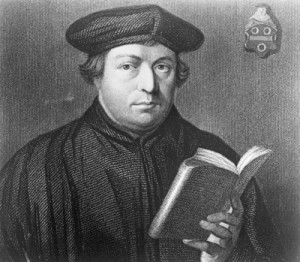There are many different styles of preaching in the Church. I tend to lean towards what is known as expository preaching. I start on Monday by looking at the Lectionary readings for the week and spend the week reading and praying over those readings. I consult commentaries and see what others have said about them, and I look online. By mid-week, I have an idea of where I am going and what I am going to say and spend a few days making notes and preparing the text for Sunday. Throughout the process, I pray that the Holy Spirit guides me and points me in the direction of what I should say.
Then there are times like this week. I completed the usual tasks, but I woke up this morning with a different message and had to start all over again. This is a frightening experience, more so for you than me since I do not know where I am going with this sermon this morning so sit back and relax, this might take a while.
Each year on October 31st, the Protestant world celebrates what is called Reformation Day. Here in the United States we move this celebration to the closest Sunday, which would be today. If we know our history than we know that on this date in 1517 Martin Luther nailed his 95 theses on the doors of the Cathedral Palace in Wittenberg Germany. This was a revolutionary act, and one that had not been done in the past. This action and the thesis itself, lite the fuse of what would become the Protestant Reformation in Europe. With the merger of the Congregational Christian Church with those of the Reformed tradition in 1957, the United Church of Christ inherited this reformed tradition.
I did not grow up in the Reformed tradition, in fact, I grew up in the tradition that was trying to be reformed, and so I had a much different view of these events. However, I do not believe for a moment, that Martin Luther was hostile to the Church, and by “the Church” I mean the Church of Rome. Luther loved the Church and was concerned that it had become corrupt, and he sincerely desired that there would be a return to the original message of the church. Without going into the bloody details of our history, let’s just say Luther’s suggestions of reform were not met in the way that he had intended them to be. Because of the desire to “always do it the way we have done it” a split occurred in the Church, and not always with the best intentions.
Last week I mentioned that the only people Jesus had harsh words for were the religious leaders of his day. You see they required the people to do all sorts of things that Scripture and the law, were not forcing them to do. They had a view of the faith that had come off the rails. In many ways Jesus was a reformer and one of his aims was to reform the church of the day. This is what Luther was doing. The religious leaders of his day had corrupted the Gospel for their ends, and Luther blew the whistle on them.
One of my favorite verses of Scripture is what has become known as the Great Commission and I think this is a verse that is very fitting for today; “Therefore go and make disciples of all nations, baptizing them in the name of the Father and of the Son and of the Holy Spirit.” Matthew 28:19
This is a statement from Jesus to his Apostles that was a command. He did not say if you have nothing better to do…. He did not say if you feel like it…. He did not say if you are comfortable with it… He just said go! But he also did not say go and make converts… He did not say go and make church members… He did not say go and form a committee, talk about it for 35 years… He said go and make disciples. A disciple, by definition, is a follower, and that is what we are being commanded to do go and make followers. But before we can make followers we have to be followers.
Last week I spoke about the radical transformation that must take place in our lives if we are to be faithful followers of Jesus. The reformation that Jesus started was revolutionary, and sometimes I think we forget that. Jesus came to set us free! The religious leaders of the day wanted people to remain slaves so they would retain their positions of authority over the people and Jesus came and broke that chain that held us back.
At the start of his ministry, Jesus gathered twelve to work along with him. He did not go to Harvard and Yale and find the best minds of his day. He did not go to the best seminaries and find the most enlightened thinkers, he went to the neighborhood and gathered regular people, he called fisherman, tax collectors, sinners, and yes even someone who would eventually betray him and oh yea his closest friend would deny him when the going got tough. He called them to follow him and over the next three years he trained them, by his example and by his words, how to be followers. And when they were ready he sent them out to do them same.
You see for them to go, they first had to come. They had to come and see, they had to come and learn, they had to be willing to change their way of thinking and leave behind some of their most cherished beliefs to become new creations in the kingdom. This was not easy; in fact Scripture provides several stories of people who, after they heard what was going to be required of them, rejected the message and walked away. This life is not for everyone! We have to have a personal reformation in our lives if we are going to be followers of Jesus Christ.
One of the slogans of the United Church of Christ is that God is still speaking, and the symbol of this is the semicolon. As a punctuation mark, the semicolon is to join two closely related independent thoughts or sentences, in other words, it is not the end of the story. The semicolon joins your life and my life together, the semicolon joins our lives with the lives of people that we have not even come into contact with, but we have to be ready, we have to be prepared. Before we can go, we have to come!
We have to come to the knowledge that our lives need reform. We have to come to the knowledge that God is still speaking to us as individuals and as a church and that the story is not complete we have to listen to that still small voice that continues to talk to us and direct us. But all of this requires that we are first open to the process of personal reformation.
Jesus did not teach his followers a set of rules and regulations. He did not say if you check off all of these boxes you will find eternal life. Jesus simply told them to love God and love your neighbor. The life of a Christian is not a life of judgment but a life of love and service, to God and each other.
Martin Luther lite to match that lite the fuse that started a reformation of spirituality and thought and that reformation continues today. Make the commitment today to a personal reformation, make the commitment today to become a disciple, and then make the commitment to Go and do them same for others.


